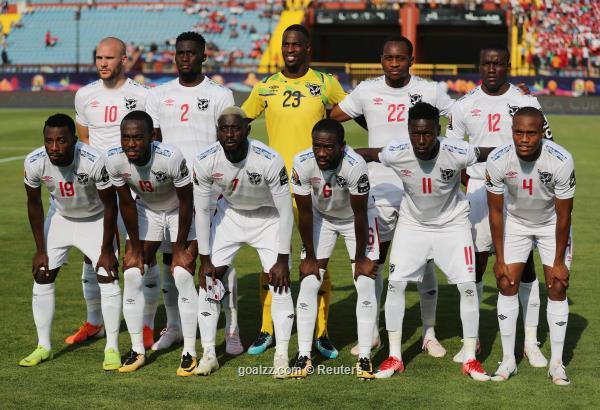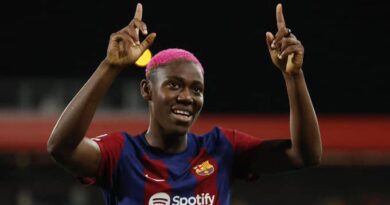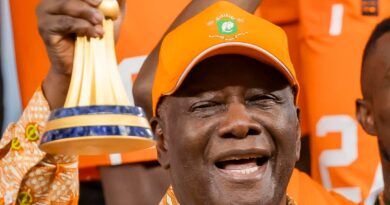Binewa Team Profile: Namibia at TotalEnergies AFCON 2023
By Muambo E. Lyonga
11/01/
Namibia is a country in Southern Africa. Its western border is the Atlantic Ocean. It shares land borders with Zambia and Angola to the north, Botswana to the east and South Africa to the south and east. Although it does not border Zimbabwe, less than 200 metres of the Botswanan right bank of the Zambezi River separated the two countries. Its capital and largest city is Windhoek. The driest country in sub-Saharan Africa Namibia has been inhabited since pre-historic times by the San, Damara and Nama people. Around the 14th century, immigrating Bantu peoples arrived as part of the Bantu expansion. Since then, the Bantu groups, the largest being the Ovambo, have dominated the population of the country; since the late 19th century, they have constituted a majority. With a population of an estimated 2.77 million people today, Namibia is one of the most sparsely populated countries in the world.
The Brace Warriors made their AFCON debut in 1998 in Burkina Faso and have played in two more tournaments, 2008 and 2019. They have never gone past the groups stage of the tournament. They are also yet to qualify for a FIFA World Cup competition.
Team Bio
Namibia had to wait till the 21st edition to make their AFCON debut in Burkina Faso. Under the tutelage of coach Ruston Mogane they travelled to Burkina Faso full of hope. Only two players from their squad for the tournament came from abroad, Frans Ananias and Philip Gariseb, both from Penzberg in Germany. They were drawn in Group C with Côte d’Ivoire, Angola and South Africa.
Forward Eliphas Kambuta Shivute became the first Namibian player ever to score a goal in the AFCON with his 46th minute goal against Côte d’Ivoire. He further endeared himself into Namibian football folklore with a second goal in the game at the 73rd minute. However, despite scoring three goals, Côte d’Ivoire scored four. A brace from Joel Tiehi and goals from Ibrahima Bakayoko and Lassina Diabaté made sure of the win for Côte d’Ivoire. Ricardo Giovanni Mannetti was also on target for Namibia in that brace 4-3 loss.
Namibia continued to show resilience and bravery like the brace warriors that they were in their second game against Angola. In an entertaining 3-3 draw, they showed that they were no pushovers. They took the lead at the 20th minute through Gervatius Uri Khob, and doubled their advantage at the 33rd minute through Robert Nauseb got their second of the game but Angola fought their way back. Lazaro pulled one back before but Uri Khob restored Namibia’s two-goals cushion. Angola showed their experience put the game level first with a goal from Paulo Silva from the spot at the 67th minute and Miguel Pereira with an 86th minute equalizer. Their final group game against South Africa was a perfect reality check. Their more illustrious neighbors put them in their rightful place with a 4-1 bashing. Benni McCarthy was simply unplayable as he scored all four goals for the defending champions. Simon Uutoni saved some Namibian pride with their seventh goal in the tournament. They were eliminated but certainly not ridiculed for first timers.
They returned to the competition ten years later in Ghana. They were in Group A with hosts Ghana, 1976 winners Morocco and Guinea. Morocco opened a two-goals lead with the first five minutes in their first game of the tournament. Brian Brendell pulled one back at the 26th minute but the Moroccan reaction was ruthless as they scored thee more goals in a 1-5 win. Morocco’s Soufiane Alloudi scored three times while Tarik Sektioui from the spot and Monsef Zerka rounded the scoring for the Atlas Lions. Junior Agogo’s goal was all Ghana needed to secure a 1-0 win against the Brave Warriors in their second game. Just like in their first participation, they made sure of at least a point against Guinea in their final game. Souleymane Youla gave Guinea the lead at the 62nd minute but Brian Brendell made sure Namibia had their point of honour with an 80th minute equalizer, his second in the tournament.
It took Namibia over a decade to return to the tournament, in 2019 in Egypt they qualified for the third time. They were drawn in Group D alongside three former champions, Côte d’Ivoire, Morocco and South Africa. They lost their opening game to Morocco 1-0 thanks to an unfortunate 89th minute own-goal from Namibian defender Itamunua Maverinjono Keimuine. Against the 1996 winners South Africa, Bongani Zungu’s 69th minute goal was the difference between the teams. They rounded up the expedition with a heavy loss to Côte d’Ivoire, 1-4 despite a goal from Joslin Kamatuka. Max Grandel, Serey Dié, Wilfried Zaha and Maxwell Cornet were on target for the 1992 and 2015 winners. For the first time in their AFCON history, Namibia bowed out without a point and were ranked 23rd out of 24 teams.
They will be coming to Côte d’Ivoire for a more honourable performance, certainly not for the ultimate accolade.
The Journey
Namibia were drawn in Group C, with Cameroon, Burundi and Kenya. The group initially consisted of four teams: Cameroon, Kenya, Namibia and Burundi. However, on May 23, 2022, CAF announced that Kenya were disqualified from the qualifiers due to the continued suspension of the Football Kenya Federation by FIFA. The group thus went ahead with only the remaining three teams.
The teams played against each other in a home-and-away round-robin format between June 4, 2022 and September 12, 2023.
Cameroon and Namibia, the group winners and runners-up respectively, qualified for the 2023 Africa Cup of Nations
Earlier Results
Game day 1
Namibia 1-1 Burundi
Game day 2
Cameroon 1-1 Namibia
Game day 3
Namibia 2-1 Cameroon
Game day 4
Burundi 3-2 Namibia
Qualifications group
Cameroon 7 pts
Namibia 5 pts
Burundi 4 pt
Zimbabwe 0 pt
Players to watch
Peter Shalulile
Born in Namibia’s capital city Windhoek, 30-year-old Peter is a product of Tura Magic FC in Namibia, a club he joined when they were playing in the NFA Khomas second division. He helped them gain promotion in the 2011–2012 season. He made his way up from the U-20 to the Senior Namibia National Soccer Team and scored crucial goals en route to their first ever trophy which was the COSAFA Cup in 2015. He joined Highlands Park who were playing in the South African second tier at the time after an impressive showing at the COSAFA Cup in 2015 and helped them gain promotion. After impressing he became desired by top South African clubs. He finally settled for Mamelodi Sundowns where he has grown to become the club’s leading front man. With three goals for Namibia in the qualifiers and finishing as Group C’s leading goal scorer, he is without any doubt Namibia’s most potent goal threat in Côte d’Ivoire.
Absalom Manyana Kamutyasha Iimbondi
32-year-old forward Absalom Iimbondi is one of the most experienced players in the Namibian team that will be in Côte d’Ivoire. He was born on October 11, 1991 in Ongwediva, Namibia. He has played for Oshakati City Football Club, Mochudi Centre Chiefs and United Africa Tigers in Namibia. He was one of three Namibian players to score a goal in the qualifiers. With 56 caps and seven goal to his name, the Khomas Nampol forward is one of the players coach Collins Benjamin will rely on in Côte d’Ivoire.
Denzil Haoseb
32-year old defender Denzil Haoseb made his debut for the senior Namibia national football team in a friendly against Botswana in Maun on 16 March 2011. He was part of the Namibia squad for the 2019 Africa Cup of Nations in Egypt. He is currently Namibia’s most capped player with 82 caps. The native of Gobabis has played for Black Africa, Jomo Cosmos, Highlands Park before joining Khomas NamPol SC. His experience will be crucial for them in Côte d’Ivoire.
Coach
Collin Benjamin
Collin Benjamin was born on August 3, 1978 in Windhoek, Namibian. He is a former player who played as a midfielder or winger notably for Hamburg and Munich 1860. He spent most of his professional career with Hamburger SV while representing Namibia at international level. Benjamin represented Namibia at the 2008 African Cup of Nations, in Ghana, earning 32 caps; he captained the team for several years. Benjamin was known for his speed and was mainly used for wing play as a defender.
He was named as the head coach of the Namibia national team in June 2022, succeeding Bobby Samaria. He helped them return to the AFCON for the first time after missing out of just one tournament, unlike after 1998, when they only returned in 2008 and then 2019.
2023 AFCON matches Group E
Namibia will kick-start its campaign against 2004 winners Tunisia on January 16, and play against 1996 winners South Africa on the 21st and Mali on the 24th of January respectively.




